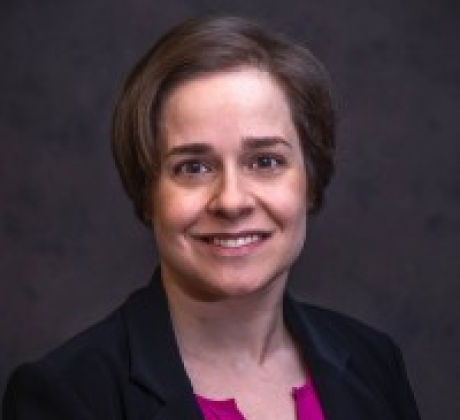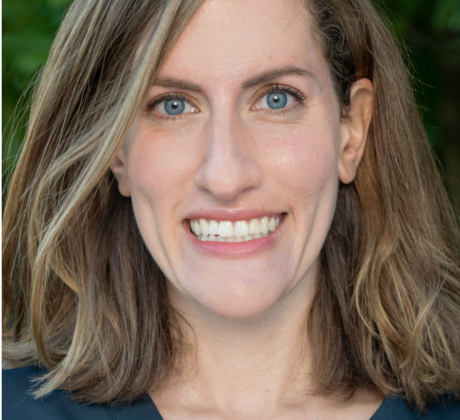Stephanie Ostroff is a speech-language pathologist and journalist. She enjoys blending knowledge from both fields to shine a light on innovators and changemakers in health care.


Renee Caslow, DO, MHCI ‘20, is on a mission to strengthen rural health
Type “rural health system” into any news search engine, suggests Renee Caslow, Physician Executive Director of Primary Care at Memorial Health System. The results will show, “They’re closing. That’s the news. They can’t maintain themselves.”
Conditions are anything but optimal: Obesity, addiction, and cancer rates run high in rural America, while profit margins run low. Waiting rooms overflow with underinsured patients experiencing chronic medical conditions. Hospitals manage staffing shortages and tight budgets. Closures are on the rise as pandemic relief funds from the federal government dry up.
“I think it’s very easy to just be like, ‘This is an impossible endeavor,’” says Caslow. “’We’re just going to stay on this sinking ship until we get bought out.’”
And yet she and her team are firmly resolved to chart the path forward for Memorial Health System, a three-hospital non-profit network tucked into a corner of southeast Ohio. They aspire toward a different approach to rural health care: less time spent putting out fires and more time preventing them.
Caslow doesn’t run on blind idealism. What propels her, she says, is knowledge. She knows her way around the American health care landscape and how to drive change within it thanks to the University of Pennsylvania’s Master of Health Care Innovation (MHCI).
Innovating to Reimagine Preventative Care
At Memorial Health System, Caslow and her team have rolled out a series of programs that focus on preventative and chronic care management. In the past, she says, the health system struggled to launch such initiatives, resulting in organizational division and inefficiency. Today, they are united around the value of preventative health and expanding access to care.
Patients are guaranteed a primary care appointment within 24 hours of requesting one thanks to a “same-day, next day access” program that Caslow championed with her team. The initiative has decreased community reliance on emergency and urgent care services while increasing primary care visits year-over-year, even as COVID-19 took center stage. By reframing Memorial Health as a “group practice” rather than a “group of practices,” Caslow and her team have pooled resources to ensure patients receive care when and where they need it.
“Where I come in is leveraging these kinds of programs and creating buy-in with providers,” she says. “It’s a lot of education, a lot of support.”
Being a part of the program gave me the tools I need to be able to process the information and then really perform optimally in those situations.
Drawing on her MHCI knowledge, Caslow prioritizes listening and consistent follow-up to galvanize stakeholders around other initiatives that center healthy habits and sideline illness. At Memorial Health, a Community Care Network provides real-time and in-home support to vulnerable patients, addressing social determinants of health in a partnership with Marietta College. Participating students train to become health coaches while offering care where it’s needed in the community. In additional outreach, the Lifestyle Medicine Department visits surrounding counties to deliver courses that emphasize nutrition and exercise.
Caslow sees the value in these community offerings, even though they don’t generate revenue. And with her influence, the providers in her health network recognize their value, too.
“I’m currently finding myself in a health system where we are truly positioned to impact care as long as we survive,” she says. “There’s a healthy, realistic respect for what really needs to happen, and there’s also a healthy, realistic understanding of the barriers. But we don’t shy away from that.”
She also supports her team as they wrestle with tough questions, such as how to prepare patients from low socio-economic backgrounds for end-of-life care. Caslow is helping to develop a program that would make this normally cost-prohibitive process accessible to anyone at a health clinic. Such initiatives can support patient wellbeing while fortifying the rural health system, as quality end-of-life care can impact a health system’s star rating. Caslow imagines cutting out the legal fees and helping patients create a plan well in advance.
“How can we do that in the office? How can we get that established for the patient?” she considers. “We know this is going to improve your quality of life at the end of life.”
Building a Rural Health Care Leader
Just before she began her online degree at Penn in 2018, Caslow became Medical Director of Pediatrics at Memorial Health System. She balanced the role alongside full-time practice as a pediatrician. To keep her rural network afloat, she needed a firm grasp of the underlying mechanisms supporting it, but the shift from exam room to boardroom left her feeling out of her depth.
“It was all a whirlwind,” Caslow says. “I found myself in payer meetings and I wasn’t entirely sure what that was all about. I had no understanding of the business aspect of medicine. I had no understanding of how delicate the community health system’s infrastructure really is.”
Through her MHCI studies, Caslow developed a new vocabulary: value-based care, fee-for-service, managed versus traditional plans. Fluency in the language of health care made all the difference in those meetings. She credits The American Health Care System, a course taught by Ezekiel Emanuel, MD, PhD, with giving her the confidence to speak up during complex conversations about her health network.
“Being a part of the program gave me the tools I need to be able to process the information and then really perform optimally in those situations,” she says. “If I had just continued in those meetings without having that foundation that the program gave me, it would have been far more difficult.”
Caslow relied on that foundation when she stepped into her current role as Physician Executive Director in 2019. As a rural hospital administrator, she must engage all stakeholders—payers, providers, and patients—to ensure her system survives.
Behavioral science is huge. I rely a lot on what I learned there when managing my relationships and interactions with providers, because getting them to change or consider things outside the box–you get that status quo bias. The biggest step forward is I feel confident I can get my primary care team to consider something different.
Concepts from her Behavioral Economics and Decision Making course, taught by Kevin Volpp, MD, PhD, have helped her catalyze changes that improve processes and patient health outcomes. She’s seen increased engagement in Memorial Health System’s homegrown Electronic Health Records initiative, improved efficiency in completion of Medicare Annual Wellness visits, and strengthened relationships between primary care physicians and specialists. Provider engagement scores have remained steady or shown modest increases in recent years, a small victory for Caslow in the aftermath of a pandemic.
“Behavioral science is huge. I rely a lot on what I learned there when managing my relationships and interactions with providers, because getting them to change or consider things outside the box–you get that status quo bias,” she says. “The biggest step forward is I feel confident I can get my primary care team to consider something different.”
Looking Back while Leading Forward
Caslow reflects on simpler times, when family physicians knew their patients’ health history from top to bottom. She knows there’s no rewinding the clock. But she also knows how to innovate within the current health care paradigm.
One program she and her team are hoping to pilot involves multidisciplinary rounding in the family medicine clinic to create more cohesive, effective chronic care management.
“My question is: If we all take a moment to sit down and talk about our patients as humans, if you had to cut out half a day a week to sit as an office and discuss the management of your patient, would that pay off in less days in the ER and less days in the hospital?”
Caslow acknowledges it will be hard to quantify that return-on-investment. But she’s not afraid to consider it.
“I think this way because of the education I received,” she says.

